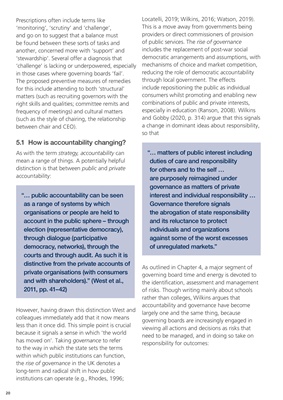
20
Prescriptions often include terms like
'monitoring', 'scrutiny' and 'challenge',
and go on to suggest that a balance must
be found between these sorts of tasks and
another, concerned more with 'support' and
'stewardship'. Several offer a diagnosis that
'challenge' is lacking or underpowered, especially
in those cases where governing boards 'fail'.
The proposed preventive measures of remedies
for this include attending to both 'structural'
matters (such as recruiting governors with the
right skills and qualities; committee remits and
frequency of meetings) and cultural matters
(such as the style of chairing, the relationship
between chair and CEO).
5.1��How�is�accountability�changing?
As with the term strategy, accountability can
mean a range of things. A potentially helpful
distinction is that between public and private
accountability:
However, having drawn this distinction West and
colleagues immediately add that it now means
less than it once did. This simple point is crucial
because it signals a sense in which 'the world
has moved on'. Taking governance to refer
to the way in which the state sets the terms
within which public institutions can function,
the rise of governance in the UK denotes a
long-term and radical shift in how public
institutions can operate (e.g., Rhodes, 1996;
Locatelli, 2019; Wilkins, 2016; Watson, 2019).
This is a move away from governments being
providers or direct commissioners of provision
of public services. The rise of governance
includes the replacement of post-war social
democratic arrangements and assumptions, with
mechanisms of choice and market competition,
reducing the role of democratic accountability
through local government. The effects
include repositioning the public as individual
consumers whilst promoting and enabling new
combinations of public and private interests,
especially in education (Ranson, 2008). Wilkins
and Gobby (2020, p. 314) argue that this signals
a change in dominant ideas about responsibility,
so that
As outlined in Chapter 4, a major segment of
governing board time and energy is devoted to
the identification, assessment and management
of risks. Though writing mainly about schools
rather than colleges, Wilkins argues that
accountability and governance have become
largely one and the same thing, because
governing boards are increasingly engaged in
viewing all actions and decisions as risks that
need to be managed, and in doing so take on
responsibility for outcomes:
"�…�public�accountability�can�be�seen�
as�a�range�of�systems�by�which�
organisations or people are held to
account�in�the�public�sphere�-�through�
election�(representative�democracy),�
through�dialogue�(participative�
democracy,�networks),�through�the�
courts and through audit. As such it is
distinctive from the private accounts of
private�organisations�(with�consumers�
and�with�shareholders)."�(West�et�al.,�
2011,�pp.�41-42)
" … matters of public interest including
duties�of�care�and�responsibility�
for others and to the self …
are�purposely�reimagined�under�
governance as matters of private
interest�and�individual�responsibility�…�
Governance therefore signals
the�abrogation�of�state�responsibility�
and its reluctance to protect
individuals and organizations
against some of the worst excesses
of unregulated markets."